Hattrick in Freiburg
Three researchers at the MPI for Immunobiology and Epigenetics receive millions in funding from the European Research Council
Dominic Grün, Nicola Iovino and Ritwick Sawarkar from the Max Planck Institute of Immunobiology and Epigenetics in Freiburg will each be awareded one of the prestigious Consolidator Grants of the European Research Council. This means that 6 million euros in funding will go to fundamental research in Freiburg over the next five years.
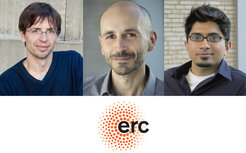
With the Consolidator Grants, the European Research Council (ERC) supports innovative and excellent basic research. This year, three scientists from the Max Planck Institute of Immunobiology and Epigenetics (MPI-IE) in Freiburg were able to succeed in the highly competitive race for the coveted funding. Dominic Grün, Nicola Iovino and Ritwick Sawarkar each receive around 2 million euros for their research projects.
“ERC funding is an important indicator of the high quality of Max Planck research here in Freiburg. I am pleased that we were successful this year with a total of four projects.” In July, Valérie Hilgers was already awarded an ERC Starting Grant. “It is particularly remarkable that three of the institute’s scientists have been awarded in the current call for proposals,” said Thomas Boehm, Managing Director of the MPI-IE.
EU funding will be invested in fundamental research to explore topics as diverse as cell-fate decisions during immune cell development or epigenetic mechanisms in the course of germ cell formation and protein folding.
Dominic Grün
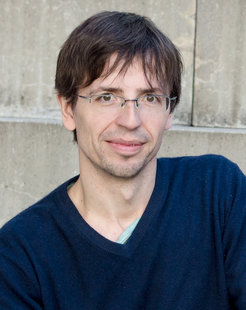
Dominic Grün is one of the pioneers of single cell analysis in Germany. With this innovative technology, the activity of genes in individual cells can be measured. The Freiburg-based Max Planck group leader is thus pursuing the goal of precisely mapping the differentiation pathways of immune cells and tissue cells in the liver. On the way from a stem cell to a mature cell types with specific functions, cells have to undergo numerous precursor stages. Various diseases, for example, cancer are caused by the fact that cells do not develop to maturity and instead proliferate uncontrollably at an immature stage. “It is not only important to know the mature cell types, but also all developmental stages, starting with the stem cell,” says Dominic Grün.
“We are particularly interested in the regulatory mechanisms controlling the commitment of a stem cell to a number of alternative fates,” says Dominic Grün. His laboratory is investigating differentiation pathways leading from the stem cell to mature cell types at single-cell resolution.
“With the help of single-cell sequencing, we are now able to analyze the activity of all genes in the genome across thousands of cells in a specific tissue simultaneously,” says Dominic Grün. In this way, the researchers create a kind of fingerprint for each cell, which enables them to identify different cell states. These states are assembled into developmental pathways. By combining this approach with microscopic analysis the researchers are also able to localize these cell states in the tissue.
With the project funded by the European Research Council, Dominic Grün and his team in Freiburg are setting out to investigate how cells in the bone marrow communicate in order to control the differentiation of immune cells from so-called hematopoietic stem cells. Until now, scientists were unable to study this crosstalk in a global way. An important aim of this project is to better understand perturbations of this crosstalk causing malignancies of the blood such as leukemia. To achieve this the group will combine studies in the mouse model with the analysis of bone marrow samples derived human patients. “The application of our high-resolution technologies to the bone marrow will reveal the signals instructing differentiation of hematopoietic stem cells and help us to better understand the perturbation of this process in leukemia. Knowing which cells are responsible for frequent relapses after successful chemotherapy or radiation treatment, can make a huge contribution to the development of tailor-made therapies,” explains Dominic Grün.
- ERC project name: Identifying spatial determinants of immune cell fate commitment (ImmuNiche)
- Dominic Grüns research: lab page and research essay: “Pebbles in the mosaic: Which cells shape our organs and where do they come from?” (German)
Nicola Iovino
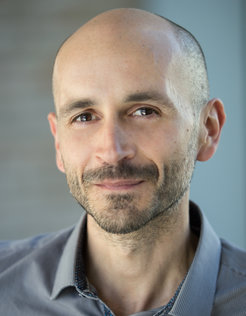
Since 2014, Nicola Iovino is heading a research group at the MPI-IE that focuses on the epigenetic mechanisms that regulate the formation of male and female germ cells and early embryonic development. Epigenetics regulate how tightly packed and thus how much accessible or inaccessible individual genome regions are in the cells. The resulting patterns of active and inactive DNA sequences give the cell its identity and control its functions.
In contrast to the fixed letters of the DNA sequence, epigenetic modifications can change in the course of life due to environmental influences or the particular lifestyle. Factors such as stress, disease or diet influence the epigenetic program of the cells. It has long been thought that the epigenetic information accumulated during life – the so-called epigenome – is erased during the development of sperm and oocytes and is not passed on to the offspring.
The team around Nicola Iovino wants to challenge this view. In the ERC Consolidator Grant project, the Freiburg researchers are investigating different epigenetic mechanisms during reproduction. “By using the fruit fly Drosophila, we have already been able to show that not only DNA but also certain epigenetic modifications are transferred from the mother's egg to the embryo,” says Nicola Iovino. The groundbreaking study, recently published in ‘Science’, further discovered that the studied epigenetic modification called H3K27me3 is also essential for the development of the early embryo. If it was missing, the embryo was not viable.
With funding by the ERC, the scientists in Iovino’s laboratory will tackle even more complex questions. They want to understand how the zygote, after the fusion of two highly specialized cell types (sperm and oocyte) can form all the body’s cells and further how epigenetic mechanisms turn zygote’s quiescent genome into an active one enabling the beginning life to control its genome on its own.
This basic research provides important insights into numerous developmental and physiological processes. But it also has great significance for human health. This applies, for example, to the prevention of hereditary diseases, the improvement of artificial insemination procedures and stem cell therapy.
- ERC project name: Epigenetic Reprogramming, Inheritance and Memory: Dissect epigenetic transitions at fertilisation and early embryogenesis (EpiRIME)
- Nicola Iovinos research: lab page and research essay “Inheritance beyond DNA: intergenerational epigenetic inheritance” (German).
Ritwick Sawarkar
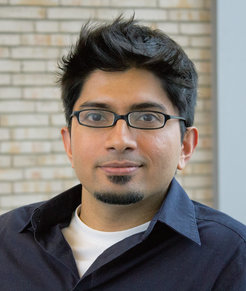
Proteins are involved in almost all processes in living cells. In order to fulfill their numerous biological functions, the chain-like molecules have to be folded into their correct three-dimensional structure. This is the only way that proteins can function. If this does not succeed or if the molecular chains clump together, this can have serious consequences. Errors in protein folding are the cause of numerous age-related neurodegenerative diseases, such as Alzheimer’s or Parkinson’s disease.
The process of protein folding is monitored by so-called chaperones. They prevent faulty clustering of proteins and stabilize them to avoid aggregation-related neurodegeneration. Researchers know, that over-producing chaperones in brains are sufficient to delay neurodegeneration and probably associated diseases. This further means, that drugs altering the chaperone level in neurons could represent a promising new form of therapy against neurodegenerative diseases.
However, it is still unknown how the chaperones in neurons are regulated, in particular during aging. This is where Ritwick Sawarkar’s project, funded by the European Research Council, comes in. “If we understand the control of chaperones, we might also be able to pharmacologically intervene in chaperone regulation and be able to prevent or cure diseases caused by protein misfolding,” says Ritwick Sawarkar. In the research project, aptly named as ‘ChaperoneRegulome’, the Freiburg-based scientists will use mammalian models to identify the cellular pathways that alter the chaperone level in the brain during aging.
Many chaperones are controlled at the transcription level. This is a step in gene expression in which genes of the DNA are read and transcribed into RNA. Accordingly, Ritwick Sawarkar and his team suspect that epigenetic regulators that control this process might be possible targets for therapeutic intervention. Given that many of these epigenetic regulators have already been studied and drugged for cancer therapy, they think about to repurpose these drugs safely for neurodegenerative diseases. “Finding the mechanisms of action of these drugs in the context of neurodegeneration will be a key to their successful application in the clinic,“ says Ritwick Sawarkar.
- ERC project name: ChaperoneRegulome: Understanding celltype-specificity of chaperone regulation (ChaperoneRegulome)
- Ritwick Sawarkars research: lab page and research essay “The role of molecular chaperones during transcription: implications in biomedicine and evolution” (German).
ERC Consolidator Grants
The Consolidator Grants awarded once a year are among the EU’s highest endowed funding measures for European scientists. Thus, the European Union honors and supports researchers who have been able to attract attention by their excellent research achievements and innovative projects. The funding is provided by the European Research Council (ERC) to outstanding scientists from all over the world who are currently working at an European research institution and have between seven and twelve years of scientific experience. In 2018, following an extensive application and evaluation process, 291 young European researchers received funding from the ERC, which corresponds to a success rate of approx. 12%. The Max Planck Society (MPG) was amongst the most successful institutions in Germany in this year’s funding round. Six ERC Consolidator Grants went to scientists in the MPG. They each receive up to 2 million euros over a period of five years for their research projects.
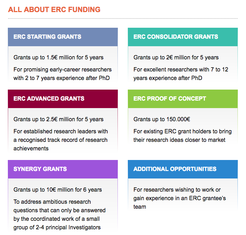
The ERC funding for Dominic Grün, Nicola Iovino and Ritwick Sawarkar again confirm the status of the Max Planck Institute of Immunobiology and Epigenetics, Freiburg as a location for European top-level research. In recent years, six Starting Grants have already been obtained from Max Planck researchers in Freiburg: Robert Schneider (2007), Andrew Pospisilik (2011), Patrick Heun (2012), Tim Lämmermann (2016), Nina Cabezas-Wallscheid (2017) und Valérie Hilgers (2018). Further, an ERC Consolidator Grant went to Freiburg and was awarded to Andrew Pospisilik in 2015. With the two ERC Advanced Grants for Thomas Boehm (2012) and Michael Reth (2012), the ERC has now, as of 2018, already awarded twelve prizes to scientists of the institute.
CV Dominic Grün
Dominic Grün, born in Bergisch Gladbach, Germany, studied theoretical physics at the University Cologne, Germany from 1998-2003. In 2006, he completed his doctorate in theoretical physics and bioinformatics at the universities of Cologne and New York. After several years of non-academic work in industry, he became a Postdoctoral Fellow at the Max Delbrück Center for Molecular Biology in Berlin from 2010 to 2012 and Research Associate at the Hubrecht Institute in Utrecht, Netherlands, from 2012 to 2015. Since 2015, Dominic Grün has been head of the research group “Quantitative Single Cell Biology” at the Max Planck Institute of Immunobiology and Epigenetics in Freiburg.
CV Nicola Iovino
Nicola Iovino, born in Naples, Italy, studied Biology at the University Federico II in Naples, Italy. He performed his doctoral studies at the Rockefeller University in New York, USA and University La Sapienza in Rome, Italy. From 2007-2013 Nicola Iovino was Postdoctoral Fellow at the Rockefeller University, New York, USA and at the Institut de Génétique Humaine at the University of Montpellier in France (IGH-CNRS). In 2014 he was appointed as Group Leader at the Max Planck Institute of Immunobiology and Epigenetics, Freiburg, Germany in the department of Chromatin Regulation.
CV Ritwick Sawarkar
Ritwick Sawarkar, born in Mumbai, India, studied microbiology at Bombay University in Mumbai and received his doctorate in biology at the Indian Institute of Science in Bangalore, India, in 2010. He was then a postdoctoral fellow at ETH Zurich. Since 2014, Ritwick Sawarkar has been an independent research group leader at the Max Planck Institute of Immunobiology and Epigenetics in Freiburg.






